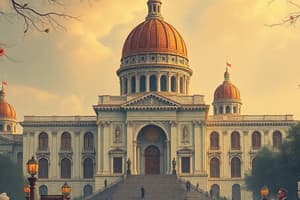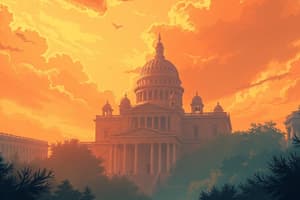Podcast
Questions and Answers
Which core area of political science focuses primarily on examining the interactions between states and international organizations?
Which core area of political science focuses primarily on examining the interactions between states and international organizations?
- Political Theory
- Public Administration
- International Relations (correct)
- Comparative Politics
Which concept refers to the legitimate power that is recognized and accepted by those subject to it?
Which concept refers to the legitimate power that is recognized and accepted by those subject to it?
- Legitimacy
- Authority (correct)
- Power
- Sovereignty
Which political ideology emphasizes tradition, social order, and the importance of institutions?
Which political ideology emphasizes tradition, social order, and the importance of institutions?
- Communism
- Conservatism (correct)
- Liberalism
- Socialism
Which political institution is primarily responsible for interpreting laws and resolving legal disputes?
Which political institution is primarily responsible for interpreting laws and resolving legal disputes?
Which of the following best describes a key focus of political economy?
Which of the following best describes a key focus of political economy?
Which research method in political science involves the statistical analysis of numerical data?
Which research method in political science involves the statistical analysis of numerical data?
Which theory in political science views the political system as a set of interconnected parts that interact with each other?
Which theory in political science views the political system as a set of interconnected parts that interact with each other?
What is the primary focus of public policy studies within political science?
What is the primary focus of public policy studies within political science?
Which international relations theory emphasizes the role of power and self-interest in shaping state behavior?
Which international relations theory emphasizes the role of power and self-interest in shaping state behavior?
Which key figure in political science is known for his work examining the acquisition and use of political power in 'The Prince'?
Which key figure in political science is known for his work examining the acquisition and use of political power in 'The Prince'?
Flashcards
Political Science
Political Science
The study of politics and government using humanistic and scientific perspectives.
Political Theory
Political Theory
Examines the history of political thought and ideas.
Comparative Politics
Comparative Politics
Analyzes political systems across different countries.
International Relations
International Relations
Signup and view all the flashcards
Sovereignty
Sovereignty
Signup and view all the flashcards
Government
Government
Signup and view all the flashcards
Power
Power
Signup and view all the flashcards
Legitimacy
Legitimacy
Signup and view all the flashcards
Liberalism
Liberalism
Signup and view all the flashcards
Political Parties
Political Parties
Signup and view all the flashcards
Study Notes
- Political science is a social science that studies the theory and practice of politics and government
- It focuses on analyzing political systems, political behavior, political institutions, and public policies
- Political science uses both humanistic and scientific perspectives to study political phenomena
Core Areas of Political Science
- Political Theory: Explores the history of political thought and the philosophical foundations of political ideas
- Comparative Politics: Compares and analyzes different political systems and institutions across countries
- International Relations: Examines the interactions between states, international organizations, and other actors in the global arena
- Public Administration: Studies the implementation of government policies and the management of public sector organizations
- Public Law: Focuses on the role of law in politics and the legal framework within which political decisions are made
Key Concepts in Political Science
- State: A political entity with a defined territory, a permanent population, a government, and the capacity to enter into relations with other states
- Sovereignty: The supreme authority within a territory
- Government: The institutions and processes through which a state is ruled
- Political System: The set of formal and informal political institutions and processes through which decisions are made and implemented in a society
- Power: The ability to influence the behavior of others
- Authority: Legitimate power that is recognized and accepted by those subject to it
- Legitimacy: The belief that a government has the right to rule
Political Ideologies
- Liberalism: Emphasizes individual rights, limited government, and free markets
- Conservatism: Emphasizes tradition, social order, and the importance of institutions
- Socialism: Emphasizes social equality, collective ownership, and government intervention in the economy
- Communism: A radical form of socialism that advocates for a classless society and the abolition of private property
- Fascism: A political ideology that emphasizes nationalism, authoritarianism, and the suppression of opposition
Political Institutions
- Legislatures: Bodies responsible for making laws
- Executives: Branches responsible for implementing and enforcing laws
- Judiciaries: Systems of courts that interpret laws and resolve legal disputes
- Political Parties: Organized groups that seek to win elections and control government
- Interest Groups: Organizations that advocate for specific policies and seek to influence government decision-making
Political Behavior
- Political Participation: The ways in which citizens engage in the political process, such as voting, campaigning, and protesting
- Political Culture: The shared beliefs, values, and attitudes that shape political behavior
- Public Opinion: The attitudes and beliefs of the public towards political issues, leaders, and institutions
- Voting Behavior: How and why people vote the way they do
- Social Movements: Organized collective efforts to promote or resist social change
Research Methods in Political Science
- Quantitative Methods: Statistical analysis of numerical data
- Qualitative Methods: In-depth analysis of non-numerical data, such as interviews and case studies
- Comparative Method: Comparing and analyzing different cases to identify similarities and differences
- Game Theory: A mathematical approach to studying strategic decision-making
- Survey Research: Collecting data through questionnaires
Theories of Political Science
- Systems Theory: Views the political system as a set of interconnected parts that interact with each other and the environment
- Rational Choice Theory: Assumes that individuals are rational actors who make decisions to maximize their own self-interest
- Institutionalism: Emphasizes the role of institutions in shaping political behavior and outcomes
- Constructivism: Focuses on the role of ideas, norms, and culture in shaping political reality
- Critical Theory: Examines power relations and seeks to challenge and transform existing social and political structures
Political Economy
- Studies the relationship between politics and economics
- Examines how political factors influence economic outcomes and how economic factors influence political outcomes
- Key areas include trade, development, and regulation
Public Policy
- The process by which governments make decisions and take actions to address public problems
- Includes agenda setting, policy formulation, policy implementation, and policy evaluation
- Policy analysis involves assessing the effectiveness and efficiency of different policy options
International Relations Theories
- Realism: Emphasizes the role of power and self-interest in international politics
- Liberalism: Emphasizes cooperation, international institutions, and the spread of democracy
- Constructivism: Emphasizes the role of ideas, norms, and identity in shaping international relations
Key Figures in Political Science
- Niccolò Machiavelli: Known for his book "The Prince," which examines the acquisition and use of political power
- Thomas Hobbes: Argued for a strong central government in his book "Leviathan"
- John Locke: Advocated for individual rights and limited government in his "Two Treatises of Government"
- Jean-Jacques Rousseau: Emphasized the concept of popular sovereignty in "The Social Contract"
- Karl Marx: Developed the theory of communism and critiqued capitalism in "Das Kapital"
- Max Weber: Studied bureaucracy and the role of authority in modern society
Challenges and Debates in Political Science
- The role of values in political science research
- The balance between quantitative and qualitative methods
- The relevance of political science to real-world problems
- The impact of globalization on politics
- The future of democracy
Current Issues in Political Science
- Political polarization and its impact on governance
- The rise of populism and nationalism
- The role of technology in politics
- The challenges of climate change and environmental policy
- The impact of economic inequality on political stability
Studying That Suits You
Use AI to generate personalized quizzes and flashcards to suit your learning preferences.




